Banking and Reconciliation
In the onCourse preferences, multiple payment types can be created, in addition to the system payment types already defined by onCourse.
For each payment type, you can define if the payment type is banked automatically or manually, and if the payment type is reconcilable, and which asset account the payment is deposited into prior to banking, and moved into after banking.
By default, an asset account named 'undeposited funds' is where all manually banked payments are deposited on creation. The asset account 'deposited funds' is where all automatically banked payments are deposited on creation, and where all manually banked payments are moved to when they are banked.
Automatically and manually banked payments are grouped where possible into daily totals. These banking deposits can then be reconciled as a group, or where needed, transaction by transaction.
Banking
As onCourse is integrated with a credit card payment gateway, the system will automatically settle payments in and payments out received via the credit card gateway, whether these payments are processed through your office or via website enrolments. This settlement process is automatically done between 7pm and 9pm each evening and will be deposited into your nominated merchant account the following business day as a single sum. If a payment is processed into onCourse after the nightly settlement cut off time, the payment will not be banked or appear in your nominated account until the day after. The grouping of the deposited credit card bankings in onCourse will match the batching of the deposits processed by your bank.
If you accept AMEX credit cards, these payment types will be grouped and deposited in a separate banking deposit in onCourse. This is because the AMEX settlement process works differently to Mastercard & Visa, and does not always settle on a daily basis. Instead, it is dependent on the value of the transactions you have processed.
If you have an EFTPOS terminal you use in conjunction with, or instead of the onCourse credit card gateway, ensure you select EFTPOS, rather than EFT or credit card, as the payment in type, even if you have processed a credit card through the terminal. EFTPOS transactions will be marked as banked on creation, and like your onCourse credit card gateway, will be settled automatically into your bank account overnight.
For payments received via Cheque, Electronic Funds Transfer (EFT), Money Order or Cash, a manual banking process will group and deposit these transactions. The 'Deposit Banking' function within the onCourse client allows you to track the date of settlement, method of payment, payment amount and staff member who performs this function. It also ensures that you do not 'double count' any funds to your nominated bank account.
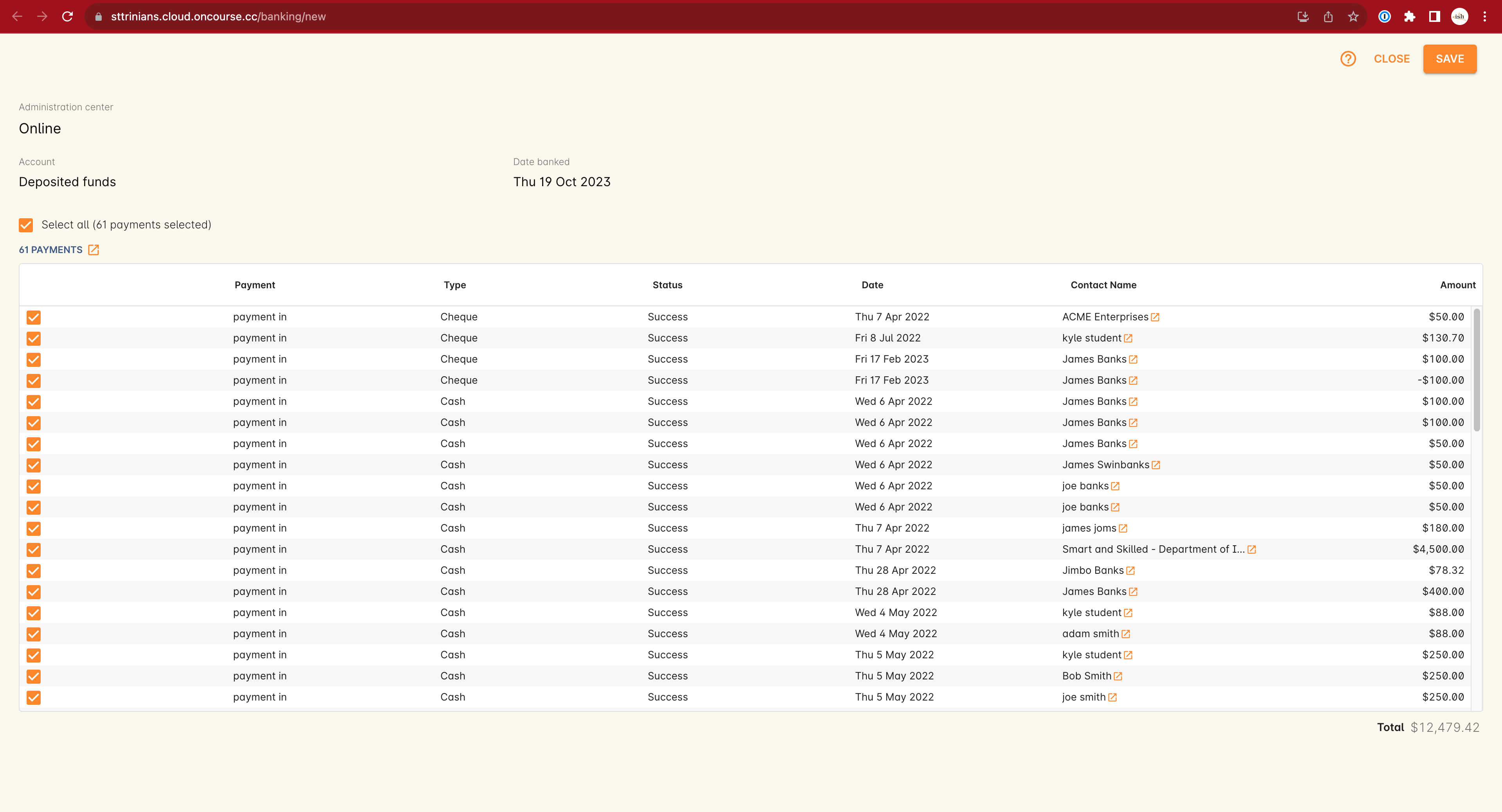
Figure 550. Banking Deposits Window
Manual banking is done on a site by site basis. As in, each physical site where manual payment types are collected should run its own banking process. You can see the site you are logged into as a user in the onCourse dashboard. If you wish to process the banking for an alternate site, you need to change your location on the dashboard first. Usually, an administration manager at each site would be responsible for running the bank process at their site.
You should collect all your payments received and confirm you have the same cash balance and cheques indicated in the bank deposit window as you complete this process.
- From the Dashboard, choose the option 'Deposit Banking'.
- If you only have one 'Deposited funds' asset account, then you will not need to make a choice of bank account. However, if you have multiple accounts, you will need to bank to each bank account as a separate process.
- This will open a window showing all the payments that have been receipted for that bank account at the site you are logged into, that have not yet been banked since the last time the banking process was run.
- Ensure the correct administration centre/banking site is selected. It appears in the top-left of the window with a drop-down box. Once the banking has been 'deposited' this cannot be changed, so you must ensure it is correct before completing the process.
- All payments are selected by default, however you can choose to untick some payments if you do not wish to bank them at this time.
- By default, the banking deposit date will be today. You can change this to a date of your choice, in the future or in the past.
If an onCourse user has reversed a payment in because they recorded the payment in error and this reversal occured prior to banking, you will see both the original payment in and the reversal of that payment in the banking window.
It is generally recommended you bank both the payment and reversal together, so they cancel each other out in a single banking process. However, if the reversal is processed due to a bounced cheque, you may wish to deposit the original payment on the day it was received and banked, and the reversal on the day it bounced.
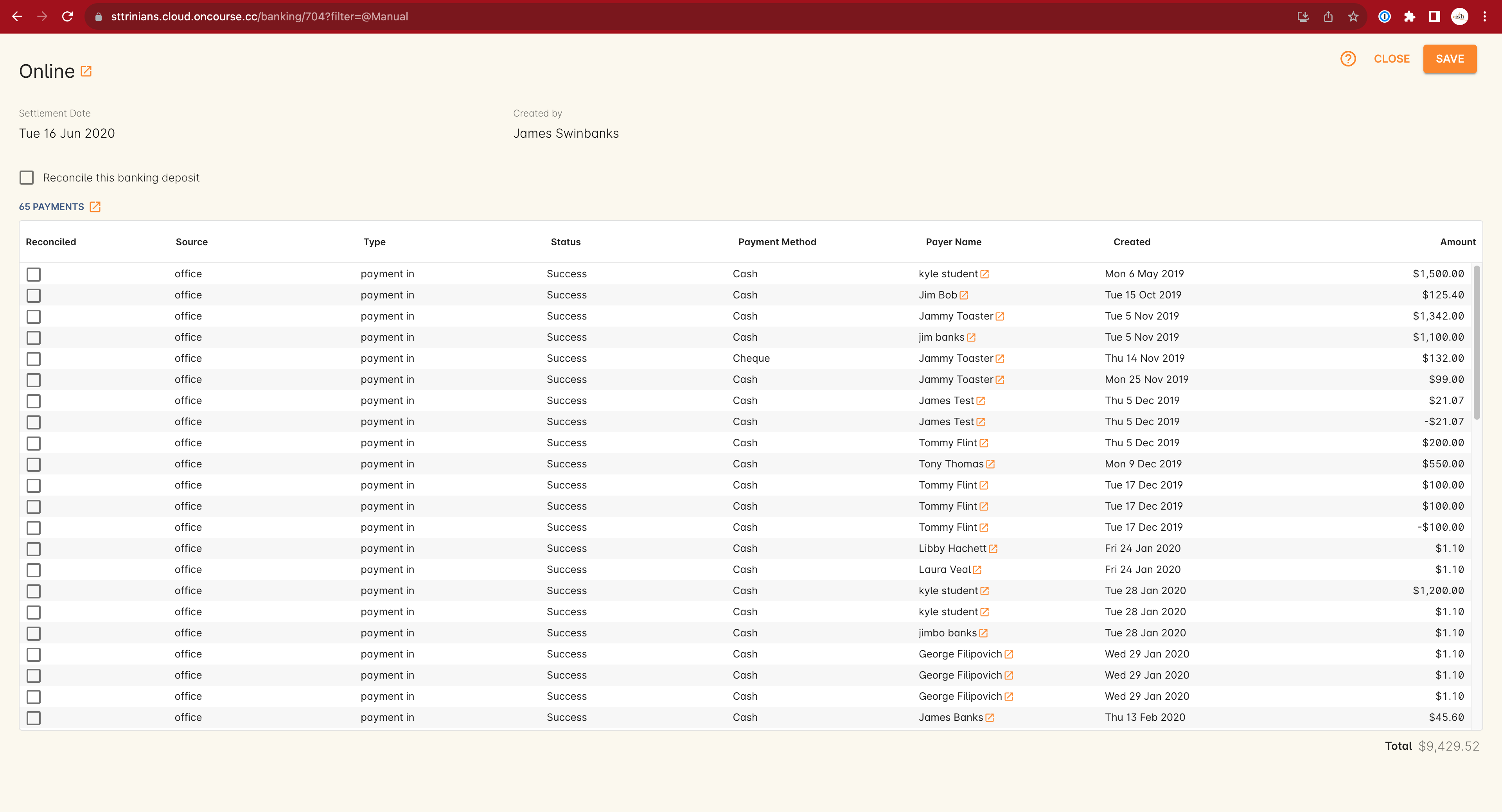
Figure 551. Numerous cash payments awaiting banking
Viewing and adjusting banking records
You can see a list of your banking history, including transactions banked automatically, by viewing the Banking Deposits window. You can access it by typing Banking Deposits into the dashboard search. In this list view you will be able to see the following information:
- The date that each amount of money is banked - The date will have been set by a user as they manually banked the money e.g. cash or cheques. Alternatively if the deposit is automatically banked, the settlement date will be automatically set as the date the funds should be received into your bank account.
- The type or the method of how these funds got banked - The method could be MANUAL (banked via a manual process), AUTO_MCVISA (Visa and Mastercard credit cards banked automatically by the onCourse credit card gateway), AUTO_AMEX (American Express credit cards banked by the onCourse credit card gateway) or AUTO_OTHER (non-credit card payments banked automatically). Prior to the 8.20 upgrade, Amex, Mastercard and Visa were banked together in a grouping type called GATEWAY.
- The site and user - This information is only displayed when the banking is type MANUAL. The site is the office location where the banking process was run, and the user is the staff member who ran the process.
- Reconciled - this check box shows as ticked if the whole banking deposit record has been reconciled.
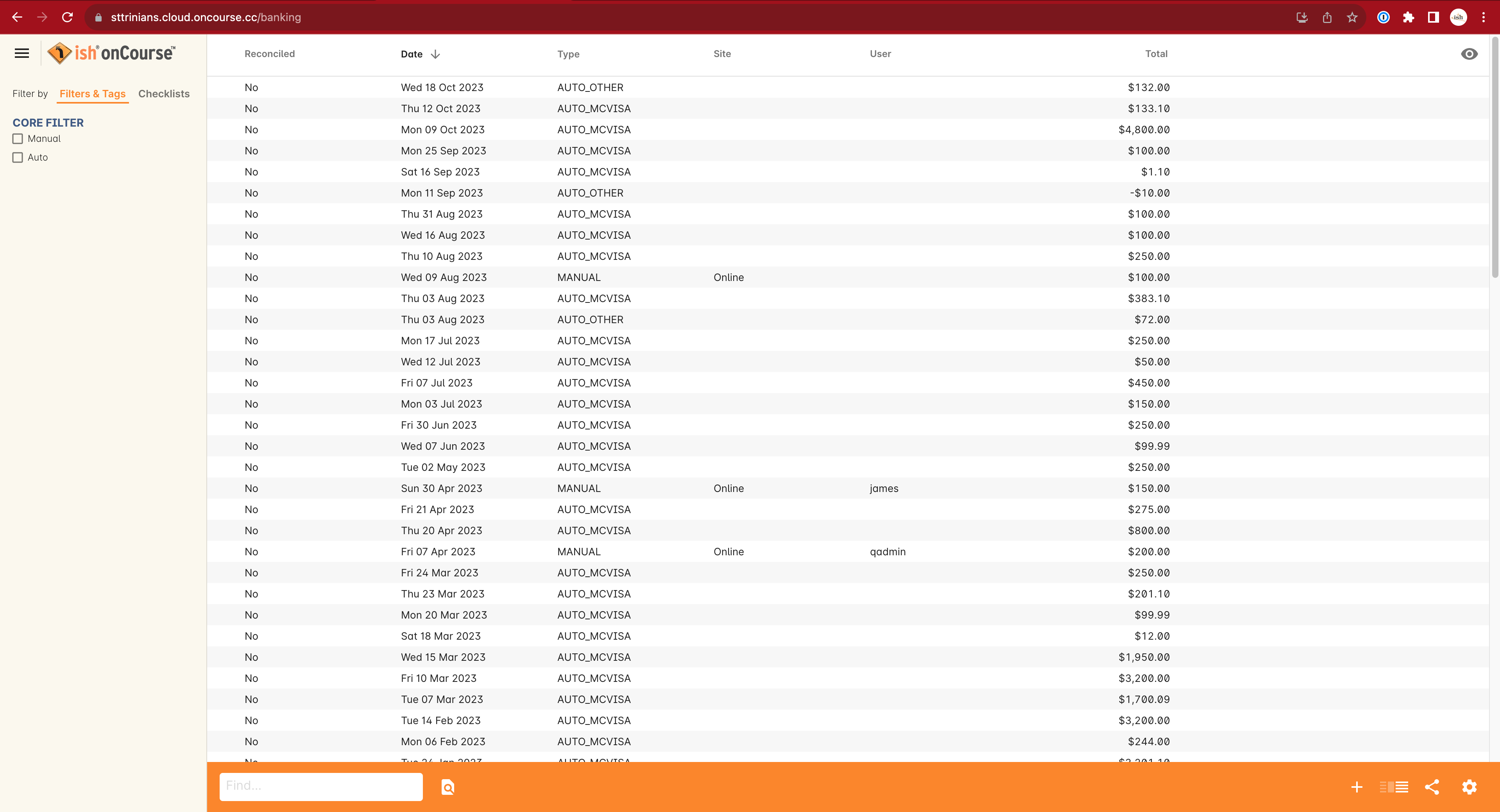
Figure 552. Banking Deposits list in 3-column view
You can double-click on a banking deposit record from this list view to adjust deposit dates or unbank transactions as required. You can alter the deposit date of the entire deposit grouping, or for individual transactions. Altering the deposit date for an individual transaction will move it from this deposit group to the deposit group of the new date. If there isn’t a deposit group for that date, a new group will be created.
Should you wish to reprint the banking report, usually created during a manual banking deposit process, you can do this from the window by selecting one or more banking deposit records and choosing 'banking report' from the Share screen.
You can also 'unbank' a transaction by highlighting the payment in the banking list and clicking on the red - icon in the top left-hand corner of the window, next to the number of payments heading; it will appear greyed out till you select at least one record. This will change journal the transaction from the 'deposited funds' asset account to the 'undeposited funds' asset account. The payment can be banked again using the manual banking deposit process as needed, or if it was processed in error or reversed.
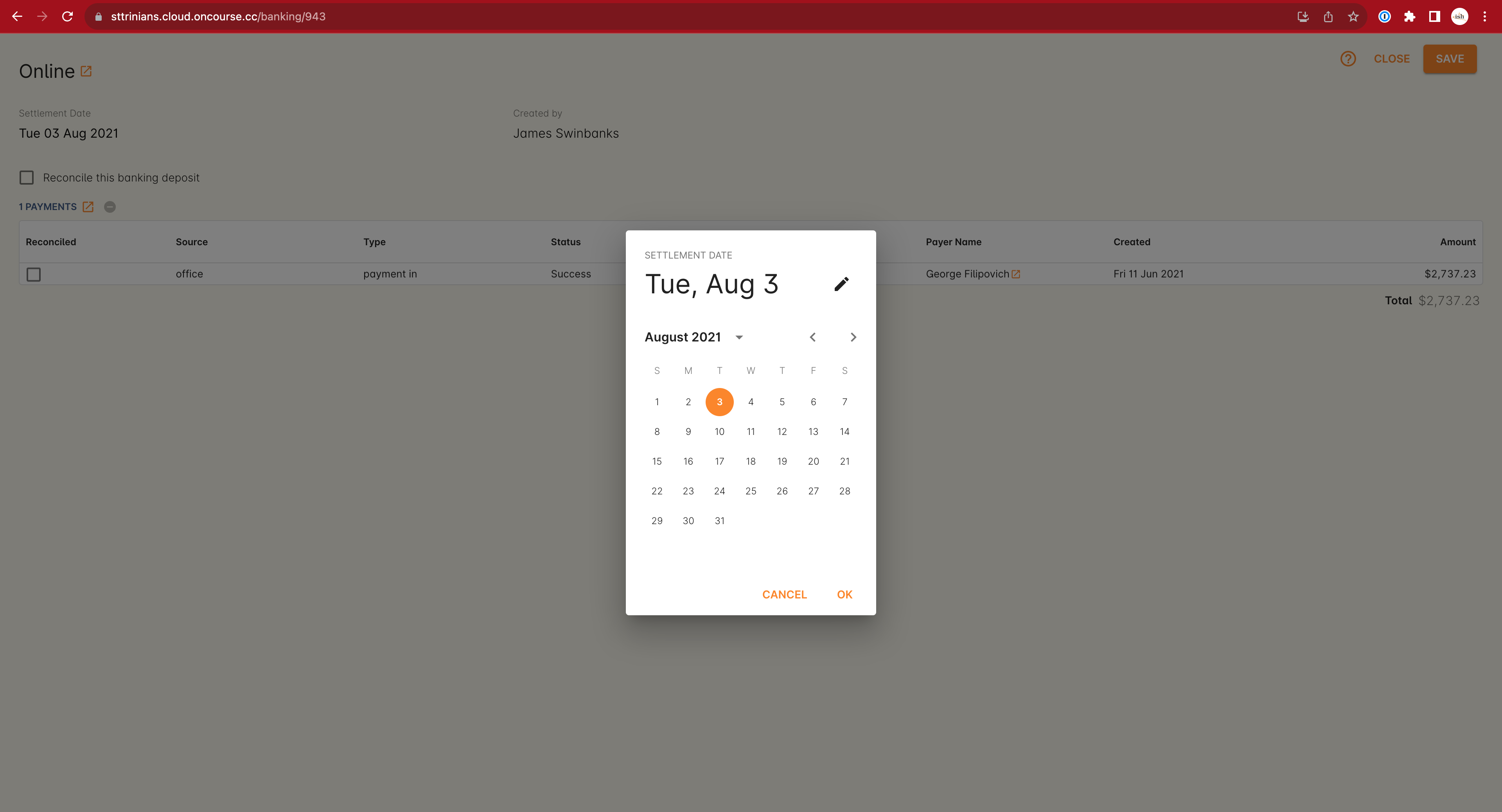
Figure 553. Changing the settlement date for a banking deposit record
To change the deposit date of a payment in or payment out record, double-click on an individual payment in record and change its date banked. It is common in the case for the date banked of EFT payments to be changed to the date the payment appeared in the bank account - often a date prior to the payment in being created, and banked, in onCourse.
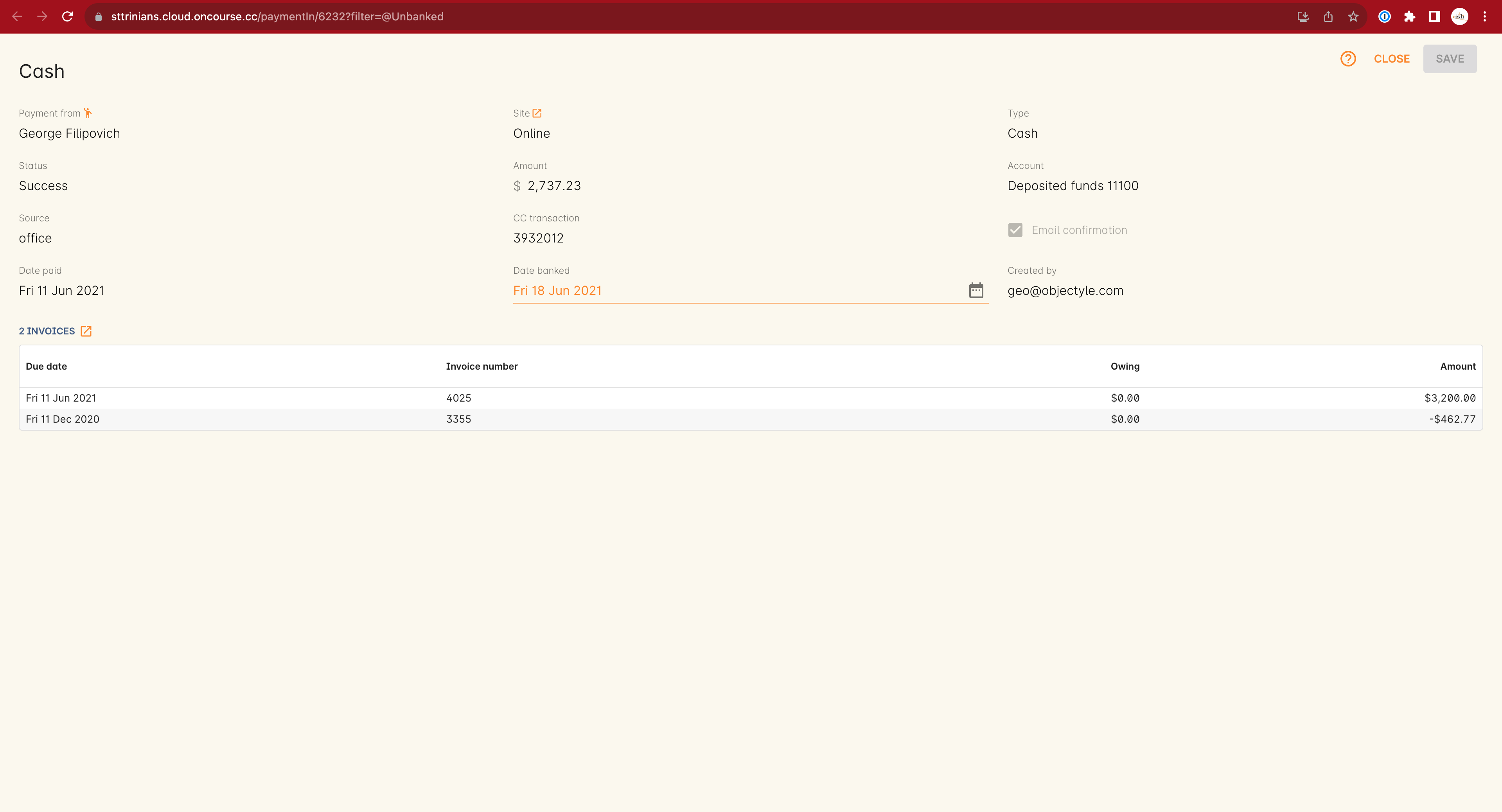
Figure 554. Changing the settlement date for a single payment record within a bank deposit
Reconciliation
Reconciliation is a process you may optionally undertake within onCourse to confirm your banking deposits match the amounts listed on your bank statement.
Reconciliation can be done on a whole of deposit basis, which is preferable for grouped automatically deposited payments, like onCourse gateway credit card payments. The same is true if done by a payment by payment basis, which is preferable for payment types like cheque deposits, or EFT.
From the dashboard, search for 'Banking deposits'. This lists all the grouped banking deposits recorded. You can double-click on one of these entries and reconcile the whole deposit by ticking 'reconcile this banking deposit', or tick individual payment records as reconciled within the transaction. When all the payments have been ticked, the whole banking deposit will be ticked as reconciled automatically.
If you prefer to reconcile from a printed report, you can also select a range of banking deposit records e.g. the complete calendar month, matching your bank account statement, and from the share screen, select the option 'cash movements detail report'. The PDF this creates can also be ticked off onscreen (although this will not update the reconciled value in onCourse) if you prefer not to print the report to hard copy.
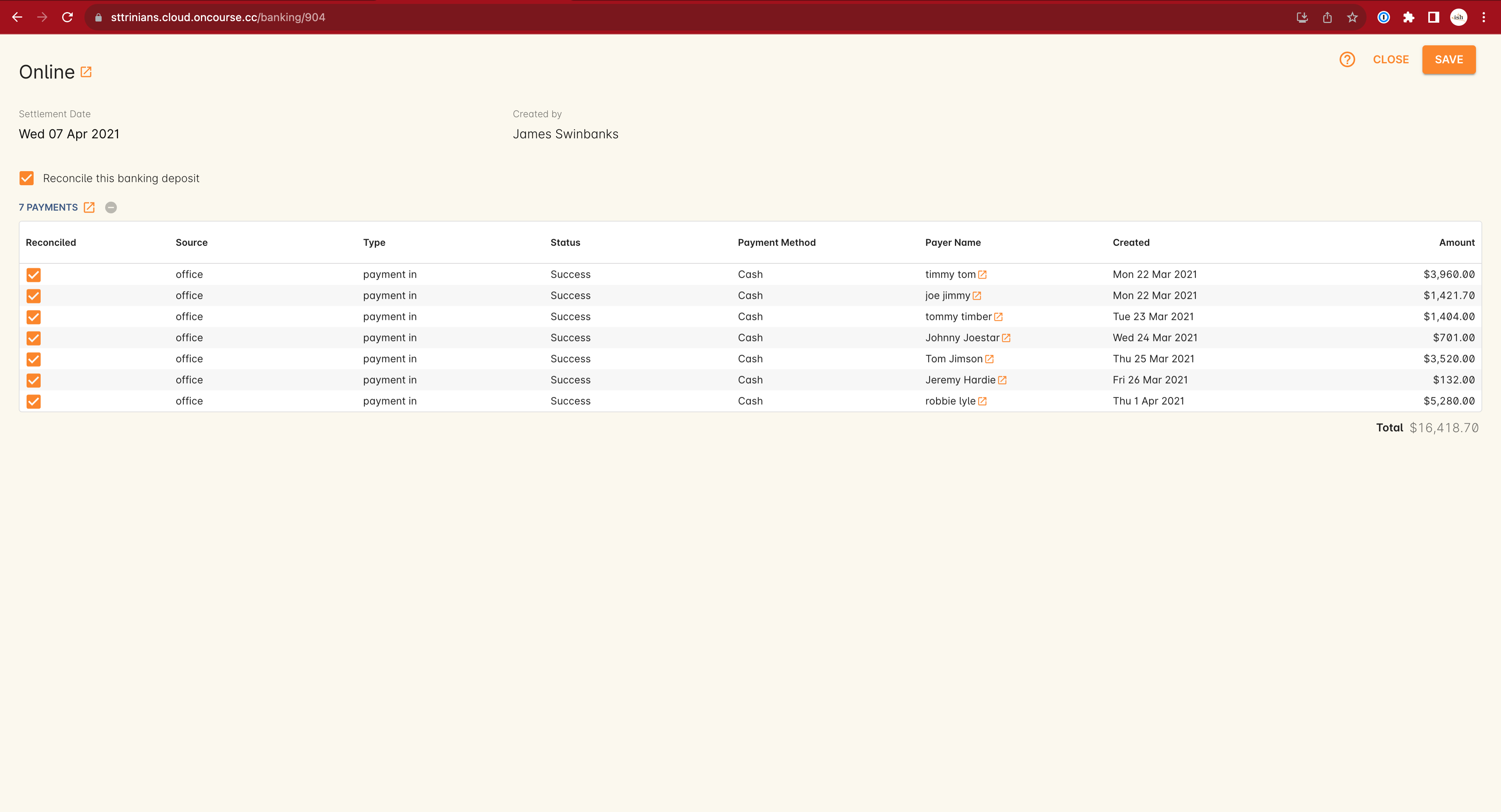
Figure 555. Reconciling a banking deposit
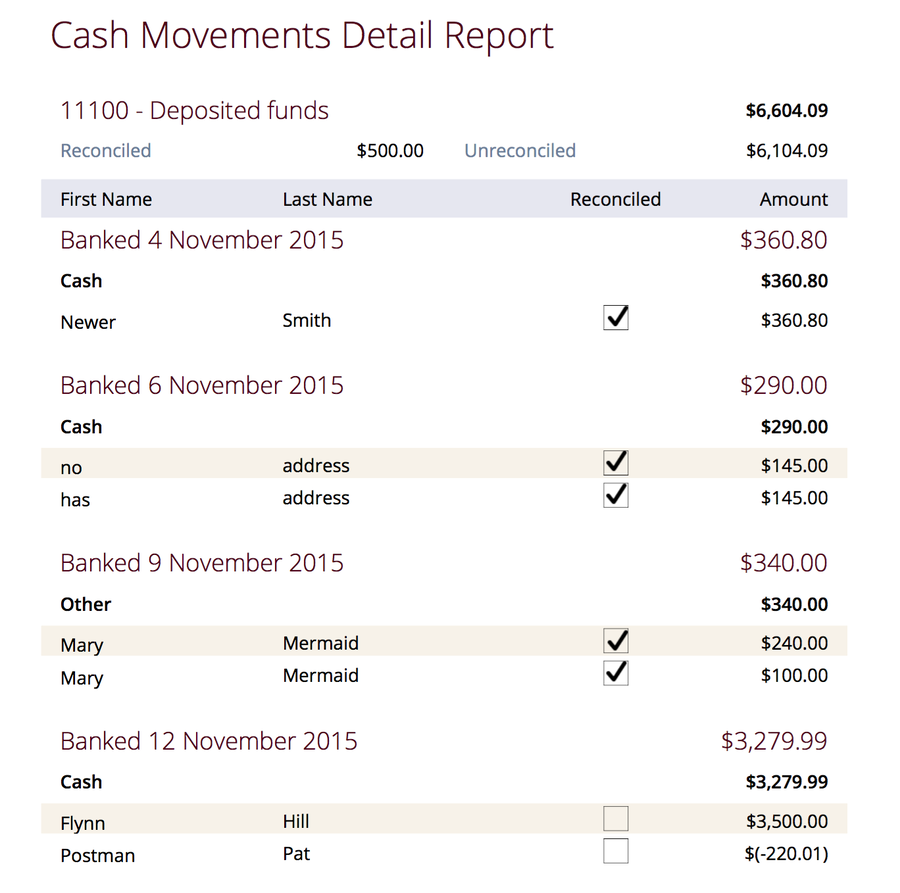
Figure 556. Reconciling a series of bank deposits from the PDF cash movements details report
Finalising periods
When you wish to lock a financial period from any further adjustments in onCourse, you can close and finalise that period.
Once a period is closed, no payments, banking records, invoices, journals or other transaction data can be added to that period, or adjusted within this period.
This process is final, and cannot be undone. Proceed with caution.
Search for 'Finalise period' in the dashboard search and select 'Finalise period' to open the window.
When the window opens, it will display the current 'locked until' date, and allow you to enter the date you wish to finalise until. This date must be in the past.
After entering the date, onCourse will check for any financial records that may need your attention before the finalisation process should proceed.
Records that should be addressed include unreconciled payments and unbanked payments.
You can run the Trial Balance for a period by searching for 'Trial Balance' in the dashboard search. Admin users will be able to run it by simply clicking on Trial Balance in the search results.
You can export a daily grouped set of journal transactions for the period by clicking on the export icon in this window.
By opening the banking deposit records for the period, you can also quickly print standard banking and reconciliation reports.
When you finalise and close the period, any banked but unreconciled payments will be banked automatically. Any unbanked payments will remain unbanked. If you bank these payments in the future, they can only be banked on dates after the finalised period.
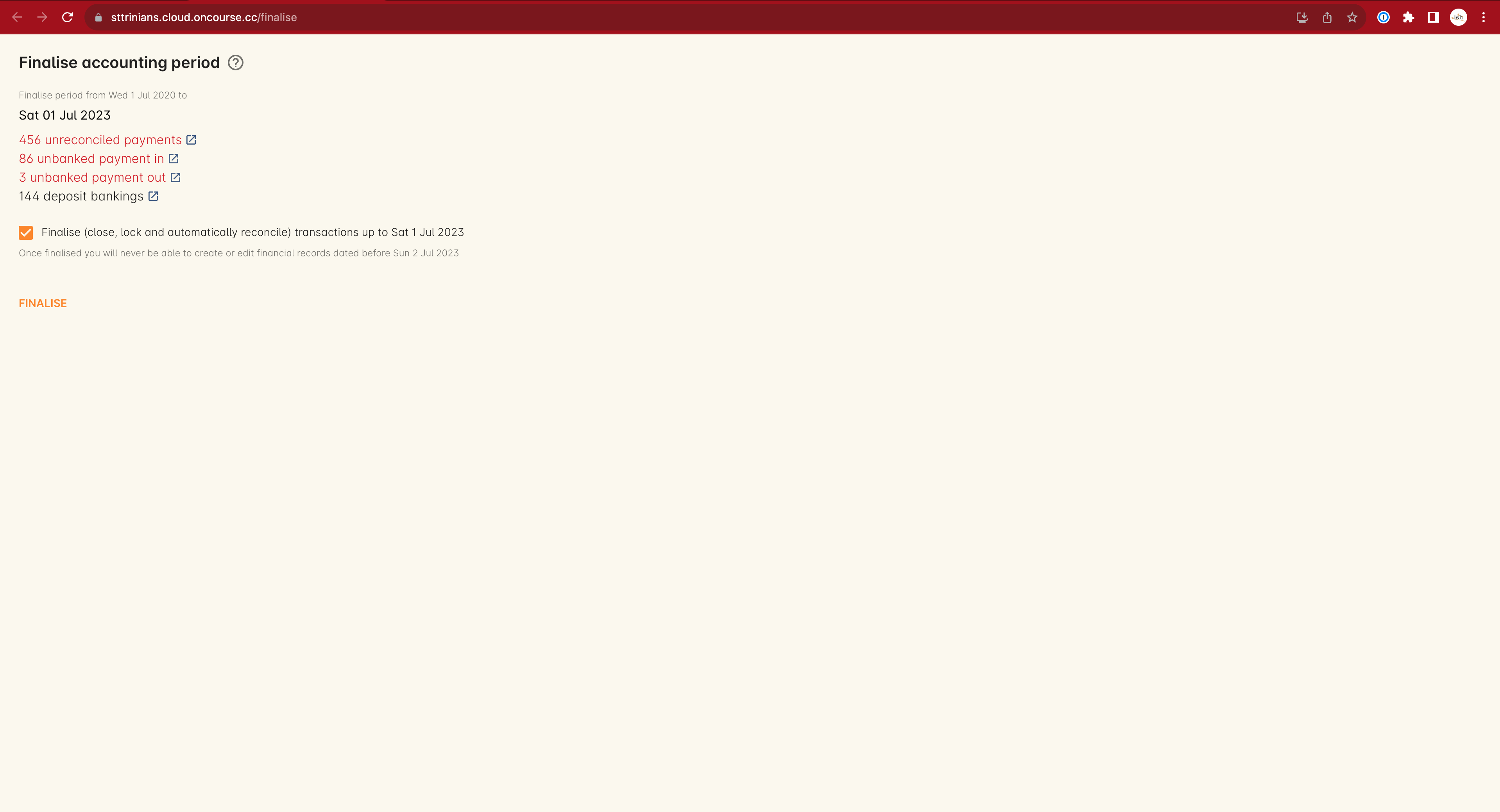
Figure 557. Warnings and report options before finalising period
General Ledger Journals
On occasion, you may find income in onCourse has been posted to the wrong account, due to the error in a class set up.
This can be resolved by journalling amounts from one account to another.
To do this, navigate to Transactions (Financial > Transactions) then click the + button.
This will open a simple window where you can choose the value as well as what account you want to journal money from and to. You can also choose to process the journal into the past, provided the period hasn’t been locked.
Journals processed in onCourse will be visible in the transactions window by selecting the core filter 'other' i.e. they are transactions in the database that were not created by either invoices or payments.
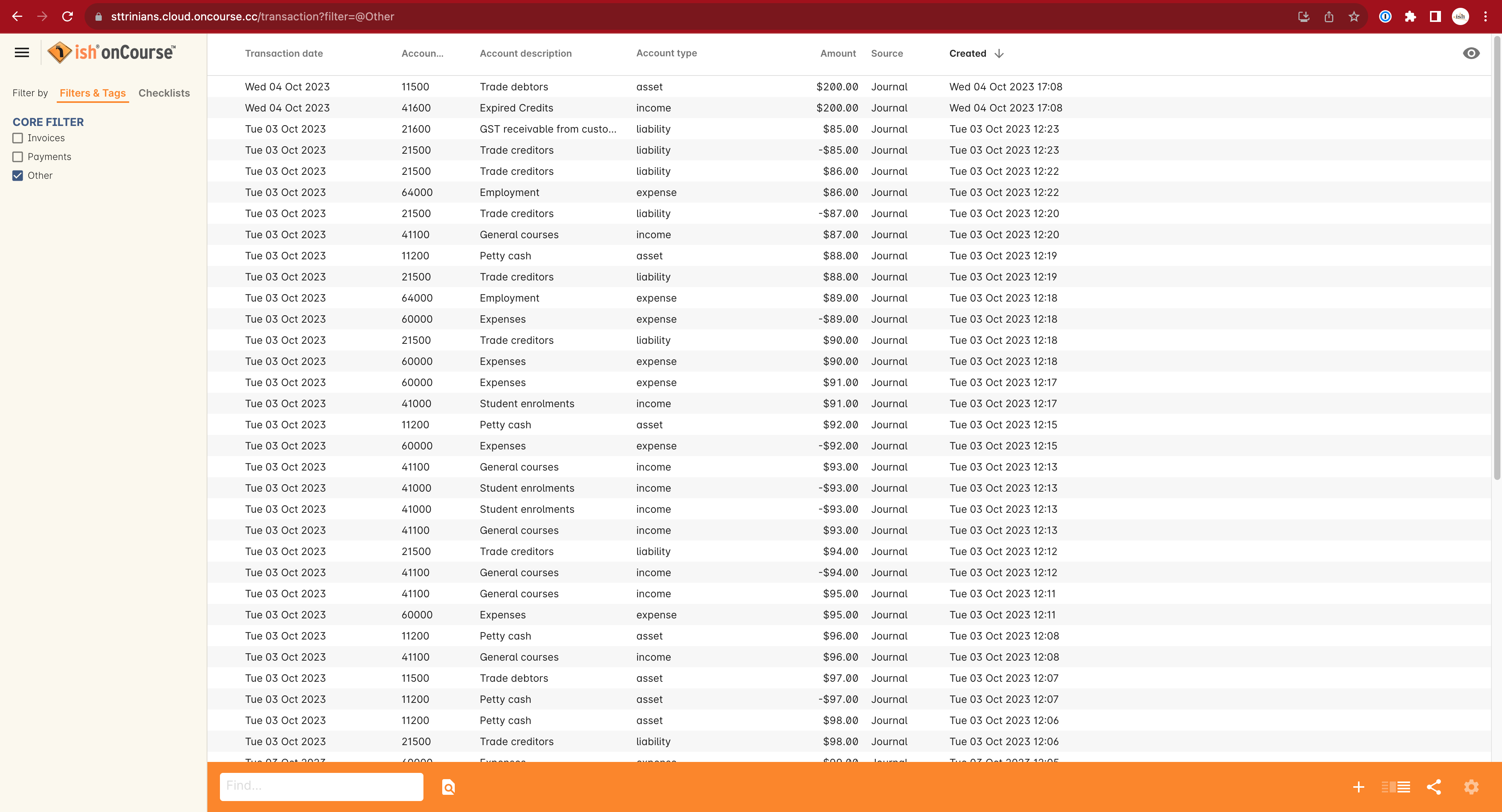
Figure 558. Journal transactions shown by choosing "Other"
If you use an accounting system external to onCourse, you may decide to do your journalling there instead.
Updated over 1 year ago
